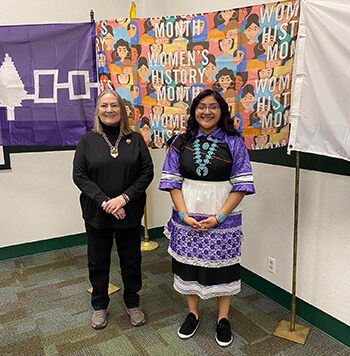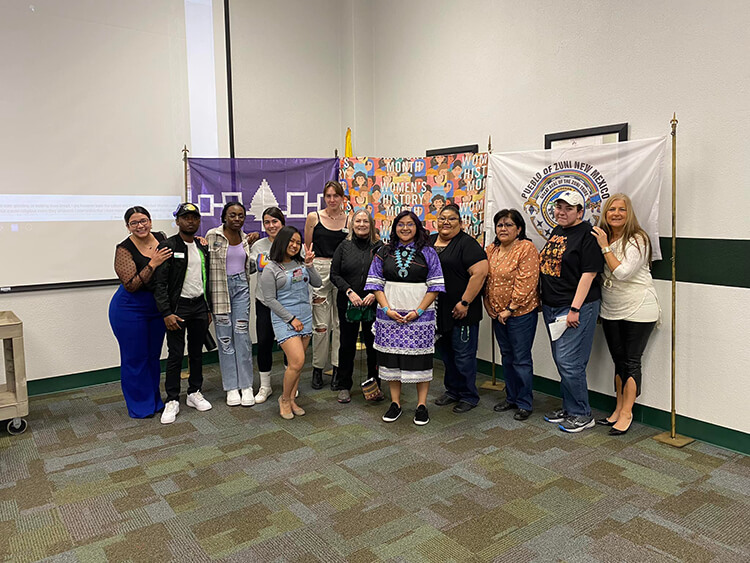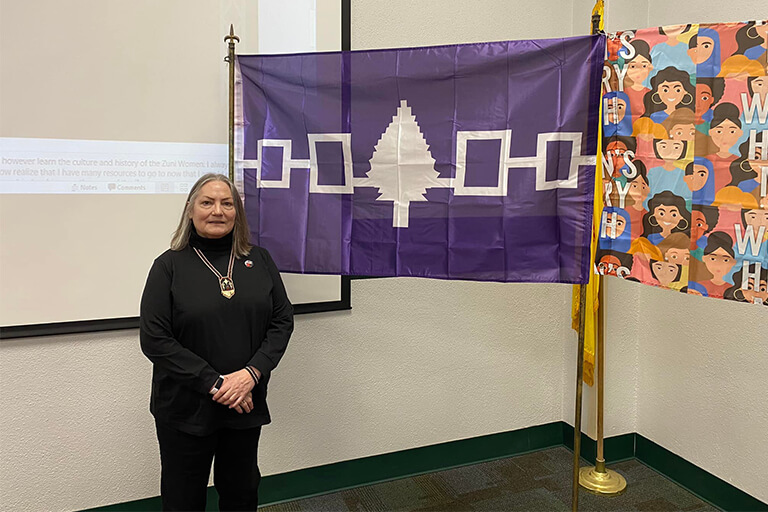Josephine Moussette Rice, a student and administrative assistant for Academic Services at Eastern New Mexico University, gave a presentation at the beginning of Women's History Month with Charis Boone, an ENMU student, titled "2 Native Women, 2 Cultures, 2 Generations."
Josephine's portion of the presentation focused on the matriarchal aspects of Iroquois and Mohawk societies and how they affect American government, politics and culture.
She discusses the presentation and her journey to ENMU, where she has begun working toward a degree.

Share how your presentation came to be.
I was asked by Diana Cordova [director of the ENMU Office of Multicultural Affairs] to speak about the Iroquois and First Nations Matriarchy for Women's History Month. I was raised in Alaska, and I am technically separated from the Matriarchy and the Bear Clan by two generations of males; my dad and his father were Mohawks, my mother was white, and my grandmother was an unenrolled French Indian.
I was raised by my dad and was taught everything he remembered from before he was orphaned and thrust into the Indian Residential School system. My only surviving brother, the only family member to live in the East and reconnect with my dad's relatives, has also shared what he could of Mohawk history and the ways of the Matriarchy. Preparing for this talk has been a labor of love for my dad, my brother, and my many cousins with whom I stay whenever I visit "The Rez."
Tell us about your family and background.
I am a widow with no living children. My younger brother, currently living in Finland, is my only surviving relative out of a family of nine.
I was born and raised on a homestead in Alaska, where Anchorage is now. My parents moved there after World War II — they had met while working on the Manhattan Project and followed the civil service jobs to the only place on American soil where they didn't have to worry about Jim Crow laws. In 1946, it was illegal for a non-white man to marry a white woman in many states, and any state could enact those laws at any time.
My father actually delivered me and asked my mother if I could be named for his mother (in Matriarchal culture, the woman "owns" the kids and names them). I've always had a special connection with my dad, which strongly influenced me throughout my life. I was educated Catholic, but Dad taught me much about the old beliefs as well.
I think my interest inspired my brother; when he was living in the East, he reconnected with Kahnawake, learned the language and was brought into the old religion through the Bear Clan.
Discuss your career before coming to Eastern.
Most recently, I was an administrative assistant for a team of federal judges who hear Social Security disability appeals in Tucson, Arizona. I returned to Alaska to care for my terminally-ill husband, then came back to job-hunt in the Southwest — just before COVID hit. Before the civil service job, I'd done mostly administrative support in the legal field, with some forays into tribal government and journalism after completing enlistments in the Army and National Guard.
What drew you to ENMU? What are your job duties?
My previous years offering administrative support to service-oriented institutions and the lure of free tuition for employees was an irresistible temptation.
I work as an administrative assistant to Academic Services with Dr. Suzanne Balch-Lindsay, assistant vice president for Academic Affairs. My duties include front desk reception, working with Microsoft software and learning Banner.
What do you enjoy the most about your job?
Learning more. Since I myself lack the expertise, I like knowing that I'm performing a background service for people who DO have the expertise to perform direct services for others. And learning. Oh — and more learning.
What goals do you have for your position?
I want to learn more about how the University functions, including the various positions and functions of the University administration. I'd also like to learn more about Banner. And — maybe, get a degree.
What is your favorite thing about ENMU?
It's a small campus, and the faculty and staff are like a big family. I like the size of Portales, though it's Big City to me, and I like living less than two miles from campus. I like the opportunity to finally take some college classes, and the online opportunities are absolutely wonderful for one who is working full-time.
Which organizations are you involved in?
I just started classes in January, but I have connected with Native Affairs and with the Veterans group here. I'm not much of a "joiner" by nature.
My volunteerism consists of crocheting hats for the homeless and using the scrap yarn to make afghans for nursing home residents or lap blankets for wheelchair-bound Vets.
In Arizona, I was involved with Flutes for Vets — a group teaching veterans on the PTSD spectrum to play Native American Flute to help calm their brains and focus their attention. I've also been involved in a 12-step program for the last 29 years.
Who is your role model?
My dad. My surviving brother. A few strong Matriarchs whom I have met along the way.
Where is your favorite place you have visited?
Alaska. I am Alaskan and will never stop missing my mountains. I'm due for another trip to Kahnawake (Dad's reserve in Quebec). But at the top of my bucket list is a week — minimum — in Washington D.C., getting lost on the National Mall and nerding out in the Smithsonian system.
What are your hobbies?
Music — I play European wood flute and Native American flute — and crafting. All kinds of crafting.




